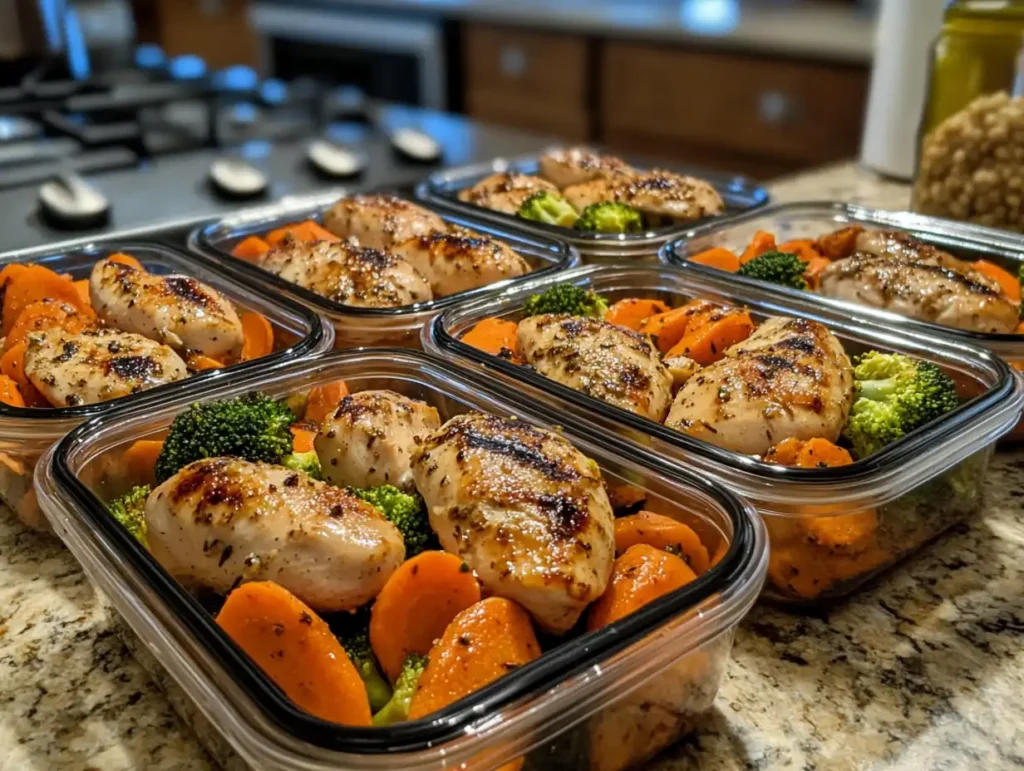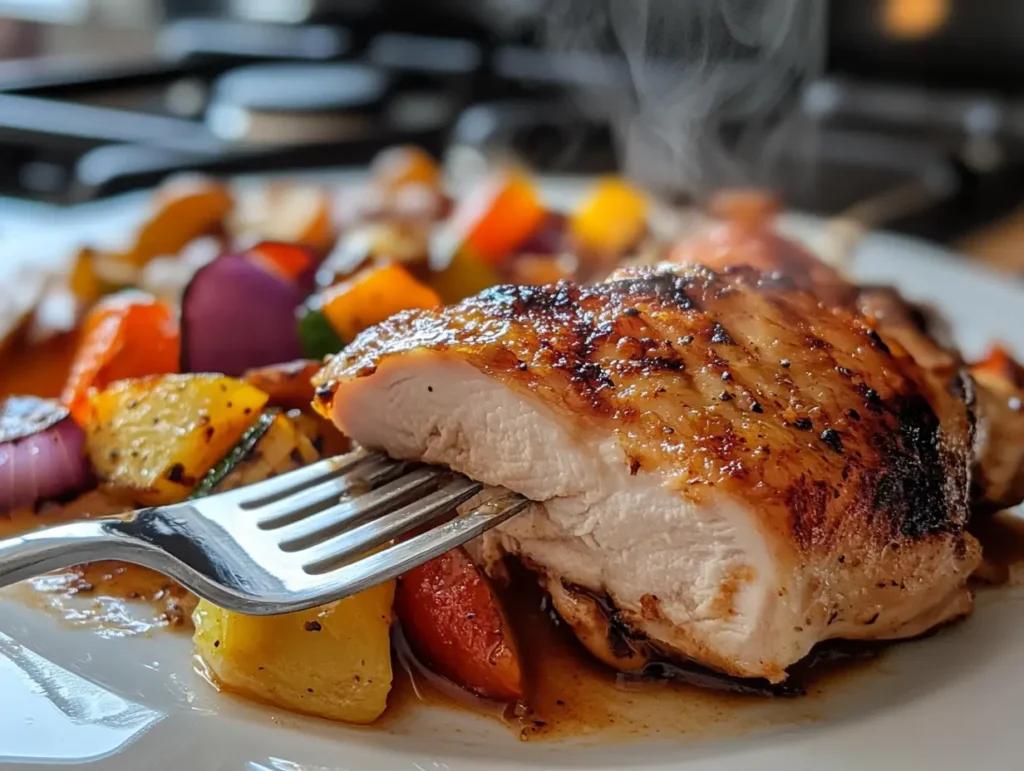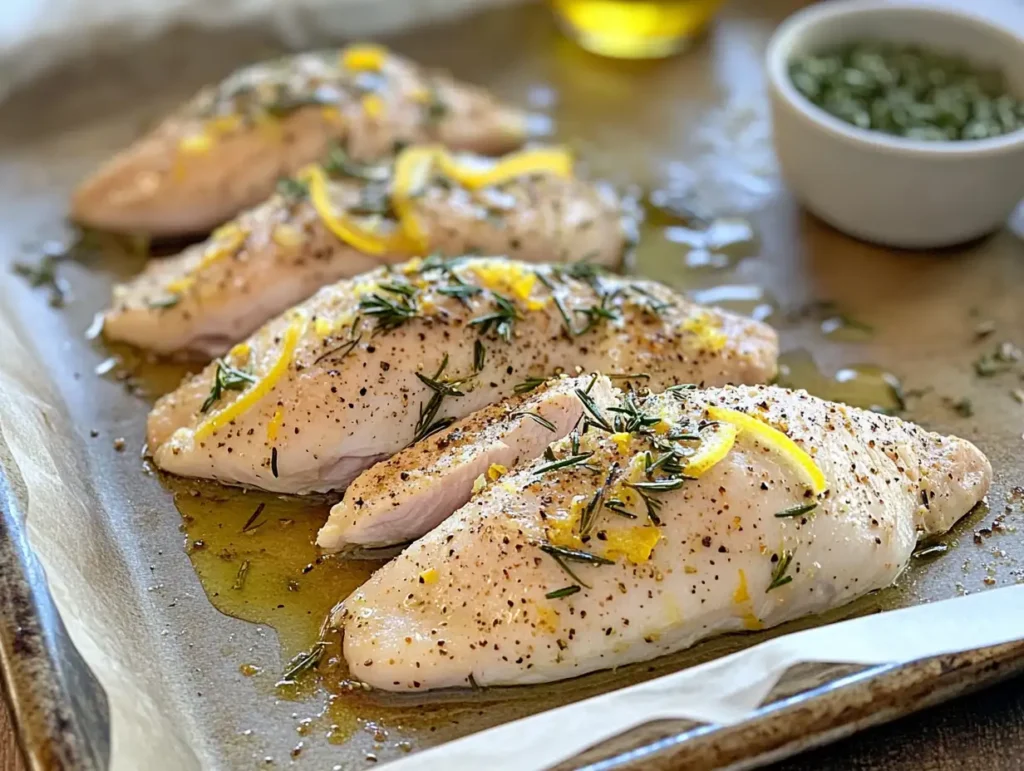Plan meals in advance with confidence. Discover safety tips, storage methods, and tasty recipes for long-lasting flavor. Is it okay to meal prep chicken for a week? Find out here!
Table of contents
Is it okay to meal prep chicken for a week? Understanding the Basics
Is it okay to meal prep chicken for a week? Many busy individuals ask this question. Basically, meal prepping helps save time. Indeed, it streamlines your weekly routine and ensures you have nutritious meals ready. However, some wonder if prepping chicken days in advance is truly safe. Comparatively, chicken can be tricky because of its susceptibility to bacteria. Nevertheless, with proper planning and handling, you can enjoy fresh-tasting, safe chicken all week long.
Is it okay to meal prep chicken for a week? Common Myths
Is it okay to meal prep chicken for a week? Some people think prepped chicken always tastes bland after a few days. Conversely, with the right seasonings and marinades, the flavor can hold up well. Another myth claims that prepped chicken dries out too fast. However, choosing proper cuts and cooking methods prevents dryness. Furthermore, many believe that chicken stored too long is always unsafe. Indeed, safety matters, but following strict guidelines keeps the chicken edible and delicious. Eventually, understanding the truth behind these myths helps you plan your meals confidently.
Is it okay to meal prep chicken for a week? Food Safety Guidelines

Is it okay to meal prep chicken for a week? Food safety experts, including the USDA, provide guidelines. For example, cooked chicken can remain safe in the fridge for up to four days. However, extending that time requires strict care. Basically, you must cook and store your chicken properly. Moreover, ensure it reaches an internal temperature of 165°F. Especially ensure quick refrigeration afterward to keep harmful bacteria at bay. Undoubtedly, following these steps is key to enjoying prepped chicken without worry.
Is it okay to meal prep chicken for a week? Flavor and Texture
Is it okay to meal prep chicken for a week? When done right, the chicken stays flavorful. Initially, choose fresh, high-quality chicken breasts or thighs. Indeed, marinate them in savory mixtures to lock in flavor. Another way to maintain taste is sealing cooked chicken in airtight containers. Comparatively, these containers keep moisture inside and unwanted odors out. Additionally, consider adding sauces after reheating to boost freshness. Equally, portioning the chicken properly helps keep the texture appealing throughout the week.
Is it okay to meal prep chicken for a week? Storing Tips and Tricks
Is it okay to meal prep chicken for a week? Proper storage is the next step. Chiefly, divide the cooked chicken into individual meal-size portions. Consequently, this reduces frequent exposure to air. Furthermore, store these portions in BPA-free containers with tight-fitting lids. Another option is to vacuum-seal them if possible. Comparatively, vacuum-sealing locks out oxygen and preserves taste even longer. Moreover, keep your fridge at a consistent 40°F or below. Generally, the cooler temperature slows bacterial growth. Consequently, every detail in storage counts.
Is it okay to meal prep chicken for a week? Reheating Safely
Is it okay to meal prep chicken for a week? Reheating properly is critical. Eventually, use a microwave or stovetop on low heat. Meanwhile, add a splash of broth or water to prevent dryness. Basically, stir or flip the pieces halfway through reheating. Additionally, ensure they reach an internal temperature of 165°F again. Indeed, never let the reheated chicken sit out for more than two hours. Accordingly, this prevents bacteria from multiplying. Particularly remember these steps, and your prepped chicken remains safe and enjoyable.
Understanding Chicken Shelf Life in the Fridge
Storing cooked chicken demands care. Generally, most experts recommend consuming cooked chicken within three to four days. However, if you plan for a whole week, you must choose methods that maintain quality longer. Meanwhile, pay attention to appearance and smell. Eventually, if your chicken shows off-colors or an unpleasant odor, toss it. Thus, always trust your senses and prioritize health over convenience.
Tips for Extending Freshness
- Cool it quickly: After cooking, place chicken in shallow containers. Subsequently, cool it rapidly in the fridge.
- Portion control: Divide the chicken into single-serve containers. Hence, you only open what you need.
- Store smart: Use airtight containers. Thus, minimal air contact keeps the chicken fresher.
- Label and date: Write the cooking date on containers. Consequently, you track freshness easily.
The Best Cuts of Chicken for Meal Prep

Choosing the right cut makes a huge difference. Comparatively, chicken breasts are lean and versatile. However, they may dry out faster than thighs. On the other hand, chicken thighs remain juicy due to higher fat content. Additionally, boneless, skinless thighs are easy to portion and cook quickly. Consequently, these cuts often taste better over several days. Moreover, shredded chicken holds moisture well and adapts to multiple recipes. Undoubtedly, experiment with various cuts to find your ideal choice.
Cooking Techniques That Work Best
- Poaching: Especially gentle. It preserves moisture and ensures tenderness.
- Roasting: Moreover, it creates a savory crust while maintaining juiciness.
- Grilling: Consequently adds smoky flavor, but watch for dryness.
- Sautéing: Comparatively quick, and you can add herbs and spices easily.
Seasoning and Marinating Strategies
Seasoning matters. Basically, a well-seasoned chicken maintains flavor for days. Initially, use simple spices like garlic powder, onion powder, paprika, salt, and pepper. Furthermore, add herbs like rosemary or thyme for extra aroma. Marinating helps too. Eventually, marinate your chicken overnight. Consequently, flavors penetrate deeply. Thus, even by day four, the chicken still tastes great. Moreover, consider acidic marinades with lemon or vinegar. Especially these break down proteins slightly, improving texture.
Suggested Marinade Ideas
| Marinade Base | Flavor Profile | Recommended Add-Ins |
|---|---|---|
| Lemon & Olive Oil | Bright, tangy, refreshing | Oregano, garlic, black pepper |
| Soy & Ginger | Savory, umami-rich | Sesame oil, chili flakes |
| Yogurt & Herbs | Creamy, herbaceous | Mint, cilantro, lemon zest |
Meal Prep Containers and Storage Solutions
Choosing containers is crucial. Basically, glass or high-quality BPA-free plastic works well. Indeed, glass containers resist staining and odors. Conversely, plastic is lightweight and more budget-friendly. Nonetheless, ensure tight lids for both options. Meanwhile, portion sizes matter. Equally divide your chicken into lunch-friendly containers. Thus, you only open what you plan to eat. Furthermore, stack containers neatly in the fridge to maintain air circulation. Consequently, your prepped chicken stays fresher longer.
Tips for Organized Storage
- Label containers: Subsequently, write dates and meal names for quick identification.
- Use shelves wisely: Chiefly place chicken containers on one shelf to track easily.
- Rotate stock: Eventually eat older meals first. Thus, no waste or confusion occurs.
Ensuring Proper Reheating Methods
Reheating can make or break your chicken’s quality. Accordingly, add a bit of moisture before reheating. Specifically, a small spoonful of broth keeps the meat tender. Additionally, microwave on medium power to avoid overcooking. Eventually, stir halfway if pieces are cut small. Furthermore, consider a quick stove-top reheat. Generally, low heat and a covered pan work wonders. Comparatively, this method preserves flavor and texture better than microwaving alone.
Reheating Do’s and Don’ts
- Do: Use a food thermometer to check internal temperature.
- Do: Reheat only once. Repeated reheating raises food safety risks.
- Don’t: Leave reheated chicken at room temperature for hours.
- Don’t: Reheat large batches at once. Work in manageable portions.
Maintaining Nutritional Value Over Several Days
You might worry about losing nutrients over time. However, properly stored and reheated chicken retains most of its protein. Furthermore, minerals and vitamins remain relatively stable. Comparatively, some vitamin loss occurs with heat exposure. Nonetheless, the overall nutritional value stays high. Meanwhile, pairing chicken with vegetables and whole grains ensures balanced meals. Consequently, you receive a broad spectrum of nutrients each day.
Add Nutritious Sides
- Roasted veggies: Broccoli, carrots, and bell peppers for added fiber and vitamins.
- Whole grains: Brown rice, quinoa, or whole-wheat pasta offer sustained energy.
- Legumes: Chickpeas or lentils add extra protein and fiber.
Preventing Boredom with Variety
Eventually, monotony kills motivation. Therefore, rotate flavors and cooking styles every week. Another approach is to serve the chicken differently each day. For example, top salads on Monday, fill wraps on Tuesday, and pair with pasta on Wednesday. Comparatively, adding sauces, salsas, or hummus creates new textures and flavors. Consequently, you’ll look forward to every meal. Especially remember that variety keeps your meal prep habit sustainable.
Weekly Menu Inspiration
- Monday: Shredded chicken tacos with fresh salsa.
- Tuesday: Chicken and veggie stir-fry with brown rice.
- Wednesday: Chicken Caesar salad wrap with crunchy lettuce.
- Thursday: Chicken quinoa bowl with roasted cherry tomatoes.
- Friday: Chicken and sweet potato mash with steamed spinach.
Adjusting Meal Prep for Different Dietary Needs
Each person’s diet is unique. Consequently, consider your nutritional goals. Are you building muscle? Generally, focus on lean chicken breasts. Are you losing weight? Accordingly, pair chicken with leafy greens and avoid heavy sauces. Are you following a low-carb plan? Undoubtedly, stick to non-starchy vegetables and skip the grains. Conversely, if you want more calories, add healthy fats like avocado or olive oil. Eventually, adapt your meal prep strategy to suit your individual health targets.
Dietary Adaptations
- Keto-friendly: Add healthy fats, reduce carbohydrates, and rely on chicken thighs.
- Gluten-free: Use gluten-free grains like quinoa and keep seasonings simple.
- Low-fat: Stick to skinless breasts and light cooking methods like poaching.
Recipe: Meal Prep Chicken for the Entire Week

Preparing a simple recipe in advance ensures delicious, ready-to-go meals. Thus, try this easy recipe to have chicken on hand all week long.
Ingredients 🥑🥕🍋🍗
- 🥄 2 pounds boneless, skinless chicken breasts
- 🌱 2 tablespoons fresh rosemary, chopped
- 🍋 2 tablespoons lemon juice
- 🧂 1 teaspoon salt
- 🌶 1 teaspoon paprika
- 🧄 1 teaspoon garlic powder
- 🏺 1 tablespoon olive oil
- 💧 1/4 cup low-sodium chicken broth
Instructions
- Marinate chicken: In a large bowl, combine rosemary, lemon juice, salt, paprika, and garlic powder. Eventually, add olive oil. Coat the chicken thoroughly. Cover and let it rest in the fridge for at least one hour.
- Cook the chicken: Preheat your oven to 400°F. Place the marinated chicken on a baking sheet lined with parchment paper. Pour chicken broth around it. Roast for about 20-25 minutes or until the internal temperature reaches 165°F.
- Cool and portion: Let chicken rest for 10 minutes. Then, slice or shred as desired. Divide into 5-7 airtight containers. Store in the fridge, ensuring proper labeling.
- Reheat and enjoy: When ready to eat, reheat gently on the stovetop or microwave. Add a splash of broth if needed.
Serving Suggestions
- Wrap it: Add chicken, spinach, and Greek yogurt to a whole-wheat wrap.
- Mix it: Toss chicken with quinoa and roasted veggies for a balanced bowl.
- Top it: Serve shredded chicken over green salads with a light vinaigrette.
Additional Tips to Keep Meal Prep Interesting
- Try new spices: For example, experiment with global flavors. Eventually, explore Middle Eastern za’atar or Indian garam masala.
- Add healthy condiments: Consequently, a drizzle of tahini or a spoonful of chimichurri changes the flavor profile completely.
- Keep sides simple: Additionally, roast a big batch of vegetables or cook a pot of brown rice at the start of the week.
Troubleshooting Common Issues
Sometimes meal prep doesn’t go as planned. Comparatively, you might overcook chicken, leading to dryness. Consequently, add a bit of sauce or broth when reheating. Meanwhile, if chicken smells off, never eat it. Eventually, trust your instincts. Furthermore, if the texture feels rubbery, slice it thinner and incorporate it into soups or stir-fries. In short, small adjustments help fix common issues.
Quick Fixes
- Dry chicken: Add sauce or serve with a moist side dish like roasted tomatoes.
- Bland flavor: Drizzle a quick dressing or sprinkle extra spices before eating.
- Tough texture: Shred the chicken and mix into a creamy casserole.
Kitchen Hygiene and Safety Measures
Unquestionably, hygiene is key. Therefore, always wash your hands before and after handling raw chicken. Moreover, sanitize cutting boards and utensils thoroughly. Additionally, keep raw chicken away from other foods to prevent cross-contamination. Specifically, use separate boards for meats and vegetables. Indeed, a clean kitchen environment supports safe meal prep practices.
Basic Safety Steps
- Wash hands: Use warm, soapy water for at least 20 seconds.
- Clean surfaces: Disinfect countertops and cutting boards after handling raw chicken.
- Use thermometers: Check internal cooking temperatures for doneness.
Making Meal Prep a Sustainable Habit
Eventually, meal prep becomes easier with practice. Initially, start small. For instance, prep chicken for only three days if you’re unsure. Accordingly, adjust the amount as you gain confidence. Furthermore, track what works and what doesn’t. Thus, you can refine your approach. In the long run, meal prepping chicken saves money, reduces stress, and promotes healthier eating.
Long-Term Benefits
- Saves time: No last-minute cooking or takeout.
- Reduces waste: By using what you have and planning portions.
- Promotes balance: Ensures a steady supply of lean protein and nutritious sides.
Frequently Asked Questions (FAQs)
Q: Can I freeze prepped chicken to extend its shelf life?
A: Indeed, freezing is an excellent option. Basically, cook and portion the chicken first. Eventually, place it in freezer-safe containers. It lasts up to 2-3 months frozen. Furthermore, thaw it in the fridge overnight before reheating.
Q: How do I ensure my chicken stays moist throughout the week?
A: Additionally, choose cooking methods like poaching or braising to lock in moisture. Moreover, always store chicken in airtight containers and add a small amount of liquid when reheating. Particularly, use sauces or broths to enhance texture and flavor.
Q: Can I meal prep chicken dishes like curries or stews?
A: Certainly, chicken curries, stews, and casseroles are meal prep-friendly. Comparatively, these dishes often taste better after flavors meld for a day or two. Nevertheless, follow the same storage guidelines.
Q: Should I season the chicken before or after cooking?
A: Generally, season before cooking to infuse flavors. Conversely, if you worry about salt, you can add more spices after cooking. However, marinating beforehand significantly improves flavor retention.
Q: What if I see a bit of liquid in the container after a few days?
A: Basically, it’s normal for some moisture to seep out as chicken rests. However, if the chicken looks slimy or has a foul odor, discard it immediately.
Conclusion
Is it okay to meal prep chicken for a week? Yes, it’s possible with proper care. Indeed, selecting quality chicken, following strict storage guidelines, and adding variety keeps meals fresh and flavorful. Equally important is ensuring safe temperatures and quick cooling. Eventually, you’ll enjoy tender, juicy chicken throughout the week. Moreover, experimenting with seasonings, sides, and cooking methods keeps boredom away. Thus, embrace meal prep and enjoy the convenience of ready-to-eat chicken daily.